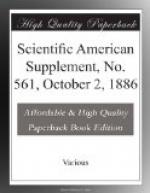When my attention was first called to this matter, I had supposed, as most people do who are outside of the railway profession, that there was something subtile and mysterious about railway engineering that none but those brought up to the business could understand. Possibly it is so, and I am merely making suggestions for what they are worth, but I think the position I have taken in this matter was established by some experiments of three weeks’ duration, which I conducted between Milan and Como, in Italy, for the Italian government, in pulling freight trains up grades of 100 feet to the mile. The experiments were made with an engine built by the Reading Railroad.
We competed with English, French, Belgian, and Austrian engines. These machines required the best of fuel to perform the mountain service, and could use coal dust only when it was pressed into brick. We used in the Reading Railroad machine different fuels upon different days, making the road trip of 120 miles each day with one kind of fuel. We used coal dust scraped up in the yards, also the best Cardiff coal, anthracite, and five kinds of Italian lignite, the best of which possesses about half the combustible value of coal.
The results in drawing heavy freight trains were equally good with each fuel, the engine having at all times an abundance of steam on heavy grades, no smoke nor cinders, and no collection of cinders in the forward part of the engine.
The fireman arranged his fires at a station, and did little or nothing except to smoke his pipe and enjoy the scenery until he reached the next station. An incident occurred to prove that we were not playing with the machine. They told me one morning that we should be given a load of 25 per cent less than the maximum load of an engine of her class (30 tons). We started up the 100 foot grade, and found we could barely crawl, and our engineer got furious over it. He thought they were repeating a trick already attempted by screwing down a brake in ascending a grade. We detected it, however, and found a pair of wheels nearly red hot. Upon this occasion we found nothing amiss, except full cars where they had reported only a light load. We pulled to the top of the hill, the steam blowing off furiously all the time.
This was a new experience to the Italians, and might surprise some Americans. When we arrived at the station, the inspector-general and his corps of engineers were evidently amazed, and it was evident we had captured them. He said to me, “I can congratulate you, signor, on possession of a superb machine.”
Afterward one of the engineers said to me: “Do not let it be known that I told you what you have hauled or I shall lose my place, but you have drawn 50 per cent more than the maximum load of one of our 40 ton engines.” I said: “You attempted to ‘stall’ us, and when you try it again, be fair enough to give me a flat of pig iron, and as you pack cars on one end I will pack




